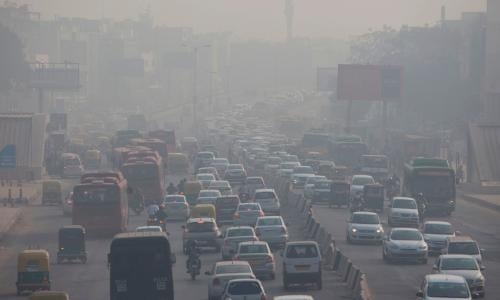22 of the top 30 most polluted cities in the world are in India
IANS | New Delhi
The Daily Tribune – www.newsofbahrain.com
All Indian cities showed air quality improvements in 2020 owing to the Covid-19 impact compared to 2018, while 63 per cent saw improvements compared to 2019, said the 2020 World Air Quality Report on Tuesday that is based on PM2.5 data from 106 countries.
In 2020, around 84 per cent of all monitored countries observed air quality improvements, largely due to global measures to slow the spread of COVID-19.
Air quality improvements across major cities in 2020 compared to 2019 include Beijing (minus 11 per cent) Chicago (minus 13 per cent), Delhi (minus 15 per cent), London (minus 16 per cent), Paris (minus 17 per cent) and Seoul (minus 16 per cent).
However, India continues to feature prominently at the top of the most polluted cities ranking, with 22 of the top 30 most polluted cities globally.
The report by IQAir said in 2020, 86 per cent of the cities in China experienced cleaner air than the previous year.
Despite this, Chinese residents are still exposed to PM2.5 levels more than three times the World Health Organization (WHO) annual guidelines. Hotan in northwestern China ranks as the world's most polluted city, largely due to sandstorms exacerbated by climate change.
Only 24 out of 106 monitored countries met the WHO annual guidelines for PM2.5 in 2020.
The report says climate change continues to affect air quality. The year 2020 is tied with 2016 as the hottest year on record. Wildfires and sandstorms fueled by the warming climate led to extremely high pollution levels in California, South America, Siberia and Australia.
South Asia is the most polluted region of the world with Bangladesh, India and Pakistan sharing 42 of the 50 most polluted cities worldwide.
In 2020, about half of all European cities exceed the WHO's target for annual PM2.5 pollution. The highest levels of PM2.5 pollution was found in Eastern and Southern Europe, with Bosnia Herzegovina, North Macedonia and Bulgaria taking the lead.
"The year 2020 brought an unexpected dip in air pollution. In 2021, we will likely see an increase in air pollution due to human activity, again," said Frank Hammes, CEO of IQAir.
"We hope this report will highlight that urgent action is both possible and necessary to combat air pollution, which remains the world's greatest environmental health threat."
"While many cities recorded temporary improvements in air quality due to lockdowns, the health impact of burning fossil fuels remained severe. Unfortunately, Delhi continued to be the most polluted capital city in the world in 2020. To see real, long-term improvements in air quality, governments must prioritize clean energy sources such as wind and solar and promote low cost, carbon neutral and accessible transport," said Avinash Chanchal, Climate Campaigner, Greenpeace India.
"Many parts of the world experienced unprecedented, but short-lived, improvements in air quality in 2020, as restrictions related to the COVID-19 pandemic caused a steep drop in fossil fuel consumption," said Lauri Myllyvirta, lead analyst at the Centre for Research on Energy and Clean Air (CREA), who also contributed to the report.
"This improved air quality meant tens of thousands of avoided deaths from air pollution. By transitioning to clean energy and clean transport we can realize the same improvements in a sustained way."
Related Posts

